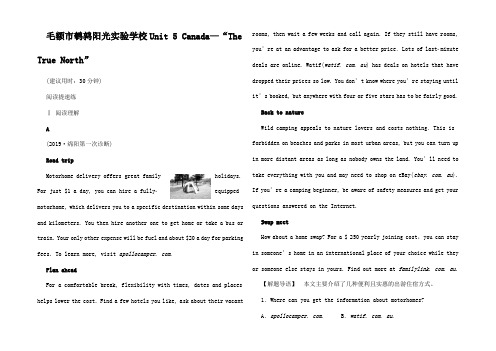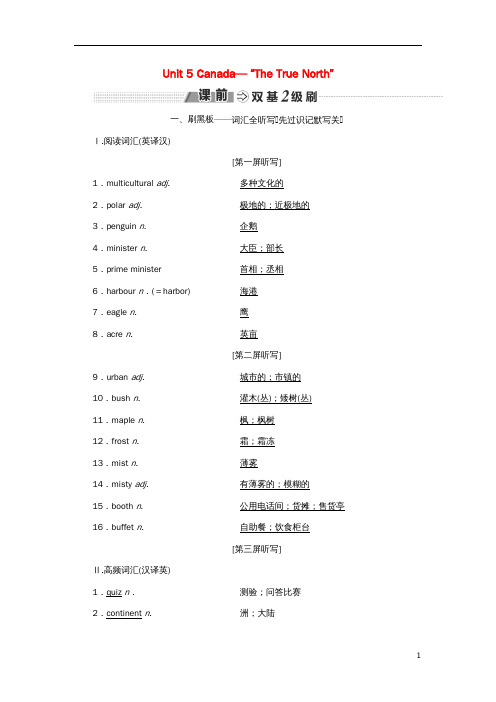高考英语大一轮复习 Unit 5 Canada —“The True North”课件 新人教版必修3
- 格式:ppt
- 大小:3.65 MB
- 文档页数:92

领兑市安插阳光实验学校Unit 5 Canada—“The True North”Ⅰ.语法填空阅读下面短文,按照句子结构的语法性和上下文连贯的要求,在空格处填入一个适当的词或使用括号中词语的正确形式填空。
The most universal facial expression is,of course,the smile—its function is to show happiness and put people at __1__(easy).It does not always mean that we are __2__(true)happy,however.Smiles around the world can be false,hiding other feelings __3__anger,fear or worry.There are unhappy smiles.For example,__4__someone loses face,he smiles to hide it.__5__,the general purpose of smiling is to show good feelings.From __6__time we are babies,we show __7__(happy)or anger by frowning.In most places around the world,frowning or turning one’s back to someone __8__(show)anger.Making a fist or __9__(shake)it almost always means that someone is angry and threatening __10__person. 1.解析:这是一个固短语:at ease舒适,无拘无束。
答案:ease2.解析:后面的happy是一个形容词,故这里填副词truly。

Unit 5 Canada—“The True North”推理判断题之隐含意义题(阅读理解)方法指导在阅读理解中,隐含意义题要求在理解表面文字的基础上,做出判断和推论,从而得到文章的隐含意思和深层意思,也就是通过文章中的文字信息、上下文的逻辑关系及事物的发展变化等已知的信息,推断出作者没有直接表达的态度和观点。
推理判断题不仅要求考生读懂文章中的每个句子的意思,还要求考生推理它们之间的关系,结合自己的生活常识和经验,再通过逻辑推理和判断,理解文章的言外之意,从而揭示文章的深层含义。
任何一篇文章都有其特定的写作目的,读者需要知道如何按照某种方式思考问题。
推理判断题的答案不可能在文章中直接找到,因此推理时我们要忠于原文,在文章中寻找并确定可推论的依据,从中推测出未知部分,切忌妄加评论,把自己的观点当成作者的观点。
典例引领 (2017课标全国Ⅱ,D)When a leafy plant is under attack, it doesn’t sit quietly. Back in 1983, two scientists, Jack Schultz and Ian Baldwin, reported that young maple trees getting bitten by insects send out a particular smell that neighboring plants can get. These chemicals e from the injured parts of the plant and seem to be an alarm. What the plants pump through the air is a mixture of chemicals known as volatile organic pounds, VOCs for short.Scientists have found that all kinds of plants give out VOCs when being attacked. It’sa plant’s way of crying out. But is anyone listening?Apparently. Because we can watch theneighbors react.Some plants pump out smelly chemicals to keep insects away. But others do double duty. They pump out perfumes designed to attract different insects who are natural enemies to the attackers. Once they arrive, the tables are turned. The attacker who was lunching now bees lunch.In study after study, it appears that these chemical conversations help the neighbors. The damage is usually more serious on the first plant, but the neighbors, relatively speaking, stay safer because they heard the alarm and knew what to do.Does this mean that plants talk to each other?Scientists don’t know. Maybe the first plant just made a cry of pain or was sending a message to its own branches, and so, in effect, was talking to itself. Perhaps the neighbors just happened to“overhear”the c ry. So information was exchanged, but it wasn’t a true, intentional back and forth.Charles Darwin, over 150 years ago, imagined a world far busier, noisier and more intimate(亲密的)than the world we can see and hear. Our senses are weak. There’s a whole lot going on.1.What does a plant do when it is under attack?A.It makes noises.B.It gets help from other plants.C.It stands quietly.D.It sends out certain chemicals.2.What does the author mean by“the tables are turned”in paragraph 3?A.The attackers get attacked.B.The insects gather under the table.C.The plants get ready to fight back.D.The perfumes attract natural enemies.3.Scientists find from their studies that plants can .A.predict natural disastersB.protect themselves against insectsC.talk to one another intentionallyD.help their neighbors when necessary4.What can we infer from the last paragraph?A.The world is changing faster than ever.B.People have stronger senses than before.C.The world is more plex than it seems.D.People in Darwin’s time were more imaginative.方法运用[语篇解读] 本文为说明文。

毛额市鹌鹑阳光实验学校Unit 5 Canada—“The True North”(建议用时:30分钟)阅读提速练Ⅰ阅读理解A(2019·绵阳第一次诊断)Road tripMotorhome delivery offers great family holidays. For just $1 a day, you can hire a fullyequipped motorhome, which delivers you to a specific destination within some days and kilometers. You then hire another one to get home or take a bus or train. Your only other expense will be fuel and about $20 a day for parking fees. To learn more, visit apollocamper. com.Plan aheadFor a comfortable break, flexibility with times, dates and places helps lower the cost. Find a few hotels you like, ask about their vacant rooms, then wait a few weeks and call again. If they still have rooms, you’re at an advantage to ask for a better price.Lots of lastminute deals are online. Watif(watif. com. au) has deals on hotels that have dropped their prices so low. You don’t know where you’re staying until it’s booked, but anywhere with four or five stars has to be fairly good.Back to natureWild camping appeals to nature lovers and costs nothing.This is forbidden on beaches and parks in most urban areas, but you can turn up in more distant areas as long as nobody owns the land. You’ll need to take everything with you and may need to shop on eBay(ebay. com. au). If you’re a camping beginner, be aware of safety measures and get your questions answered on the Internet.Swap meetHow about a home swap? For a $ 250 yearly joining cost,you can stay in someone’s home in an international place of your choice while they or someone else stays in yours. Find out more at familylink. com. au.【解题导语】本文主要介绍了几种便利且实惠的出游住宿方式。



毛额市鹌鹑阳光实验学校Unit 5 Canada—“The True North”Ⅰ.阅读In the fifteenth century Italy had no single ruler.Instead it was a collection of independent states,known as “city states” because each one was run by a central city such as Florence.Some were small; some were large.Most states had their own government,laws and money.During the Middle Ages,five city states became very rich and powerful.For example,Venice became rich from its trade with the Far East,the Mediterranean and the rest of Europe.Banks in Florence lent money to businesses and governments all over Europe.There was great competition between the city states—which led to regular wars—and between the families which ruled them.The city states also competed with each other to build the grandest or tallest buildings.Let’s look in detail at one city—Florence.In 1400 Florence was one of the largest cities in Italy.It was the centre of a rich trade in wool and cloth.One-third of the workers in Florence worked in the wool trade.The most powerful family in Florence was the Medici family,who had made their money through banking.The most famous member of the family was Lorenzo de’ Medici who ruled the city between 1469 and 1492.The other powerful people who had influence in Florence were the members of the guilds(行业协会).Craftsmen such as carpenters each had their own guild.If you were a member of a guild and over 25 years old then you could be involved in governing the city.The rulers of Florence wanted their city to be impressive and famous.The Medici collected books and built a huge library to house them.They spent money on renovating (修复) old buildings and putting up new ones.They built a splendid palace and employed painters and sculptors to decorate it.Some of the best and most famous artists were brought to work in Florence.1.What do we know about the city states?A.They ruled themselves.B.They were made up of five cities.C.They didn’t trade with each other.D.They disappeared during the Middle Ages.2.Which of the following can describe the relationship between the city states?A.Strong.B.Inflexible.C.Unfriendly.D.Cooperative.3.According to the text,the Medici family .A.created their own guildB.contributed a lot to FlorenceC.was the single ruler of FlorenceD.became rich through doing woodwork4.Why did some artists go to Florence?A.Because there was great demand for art in Florence.B.Because there were many famous artists in Florence.C.Because Florence was well-known for its art trade.D.Because other cities had no interest in art.语篇解读:本文是说明文。
话题15 加拿大概览〔Unit 5 Canada-“The True North〞〕晨读背诵根底知识自测一、单词拓展(A)根据音标与词义写出英文单词。
1.minister[ˈmɪnɪstə(r)] n.大臣;部长2.chat [tʃæt] vi. & n.聊天;闲聊3.scenery [ˈsiːnərɪ] n.景色;风景4.eastward [ˈiːstwəd] adv. & adj.向东;向东的;朝东的→westward [ˈwestwəd] adv. & adj.(反义词)向西,向西的;朝西的5.surround[səˈraʊnd] vt. & vi.包围;围绕→surroundings [səˈraʊndɪŋz] n.(复)周围的事物;环境→surrounding [səˈraʊndɪŋ] adj.周围的6.measure[ˈmeʒə] vi. & vt.测量;衡量;判定 n.计量制;计量单位;措施→measurement ['meʒəmənt] n. 测量;衡量7.aboard[əˈbɔ:d] prep. & adv.在船、飞机、火车或公共汽车上→board[bɔ:d] vt. & n.(在/上)船等8.within [wɪˈðɪn] prep.在……之内9.border[ˈbɔːdə(r)] n.边界;国界;边沿 vt. & vi.与……接壤;接近10.slight[slaɪt] adj.轻微的;微小的→slightly[ˈslaɪtlɪ] adv.稍微;轻微地11.mix [mɪks] vt. & vi.混合;调配→mixture[ˈmɪkstʃə(r)] n.混合(物);混合状态12.confirm [kənˈfɜːm] vt.证实;证明;批准13.wealthy [ˈwelθɪ] adj. & n.富有的;富人;有钱人→wealth [welθ] n.财富14.distance[ˈdɪstəns] n.距离;远方→distant [ˈdɪst(ə)nt] adj.远的,远方的15.broad [brɔ:d] adj.宽阔的;广泛的16.nearby[ˈnɪəbaɪ] adv.在附近 adj.附近的;邻近的17.tradition[trəˈdɪʃ(ə)n] n.传统;风俗→traditional [trəˈdɪʃən(ə)l] adj.传统的18.terrify[ˈterɪfaɪ] vt.使恐怖;恐吓→terrifying[ˈterɪfaɪɪŋ] adj.令人畏惧的→terrified[ˈterɪfaɪd] adj.感到畏惧的→terror [ˈterə(r)] n.恐惧→terrible[ˈterɪb(ə)l] adj.恐怖的;恐惧的19.impress [ɪmˈpres] vt.使印象深刻;使铭记→impression [ɪmˈpreʃ(ə)n] n.印象→impressive [ɪmˈpresɪv]adj.给人深刻印象的;感人的(B)单词活用用所给词的正确形式填空。